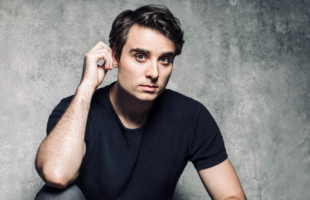Competitions
Tokyo Grand Prix: Heaven Knows What (directed by Joshua Safdie, Benny Safdie) ©2014 TIFF
Special Jury Prize: The Lesson (directed by Kristina Grozeva, Petar Valchanov)
Award for Best Director: Joshua Safdie, Benny Safdie (Heaven Knows What)
Award for Best Actress: Rie Miyazawa (Pale Moon)
Award for Best Actor: Robert Więckiewicz (The Mighty Angel)
Award for Best Artistic Contribution: Test (directed by Alexander Kott)
The Audience Award: Pale Moon (directed by Daihachi Yoshida)
WOWOW Viewer’s Choice Award: Test (directed by Alexander Kott)
Asian Future
Best Asian Future Film Award: Borderless (directed by Amirhossein Asgari)
The Spirit of Asia Award by the Japan Foundation Asia Center: Director Sotho Kulikar (The Last Reel)
Japanese Cinema Splash
Best Picture Award: 100 Yen Love (directed by Masaharu Take)
Japanese Film Splash, Special Mention: Ecotherapy Getaway Holiday (directed by Shuichi Okita)
SAMURAI Award: Director Takeshi Kitano, Director Tim Burton
The newly established award, the Samurai Award was presented to Director Takeshi Kitano and Director Tim Burton. They were each presented with a trophy by Yasushi Shiina, Director General of TIFF. Kitano commented, “I think I was in the first TIFF which was still a small festival. Then the Green Carpet appeared that made us feel like grasshoppers. I understand there’s no prize money but a trophy made up of left over material from other nicer trophies. I didn’t want to receive the prize but when I heard that Tim Burton was coming, I didn’t feel so ashamed. I wasn’t satisfied making TV and comedy shows but I finally feel like I’m casting off my skin. Not like a snake turning into a larger snake, but more like a cicada turning into a dragonfly.”
Burton said, “Thank you for having me. Japan is one of my favourite countries, so it’s an honour to be here with all of you, with the great Takeshi Kitano, and with the Japanese monsters that I love.”
The Japanese Cinema Splash section Best Picture Award, was presented to 100 Yen Love, directed by Masaharu Take. Christian Jeune, Deputy General Delegate at the Festival de Cannes welcomed Take to the stage and jury member Kazuyoshi Kumakiri presented a trophy.
Take said, “This film started from a small scenario, but with the award we received, it’ll help us spread this movie to a larger audience.” Take added, “Film festivals are a good platform for independent filmmakers, but it’s important to have an open mind, to want to promote your film worldwide. Young filmmakers should be more active in trying to deliver their films to the world.”
Jury member, Tony Rayns made a comment on the judging process. “We saw all sorts of films like one that was homage to Federico Fellini, about a film that taught us the meaning of love, or one that none of us could understand! We were impressed enough by another film which we also thought deserved a special mention, which is Ecotherapy Getaway Holiday directed by Shuichi Okita. We thought Sakura Ando in 100 Yen Love gave a heroic performance, we liked the music and we particularly liked how Take-san directed the film. I think he expressed the deep understanding of what it means to be defeated. I hope this film will be a great success.”
The Asian Future section saw two winners. Director Sotho Kulikar with her film, The Last Reel, won The Spirit of Asia Award by the Japan Foundation Asia Center. “This was my first film as a director and my first film to be in such a prestigious festival, so this award is very meaningful to further erect my career. I’m grateful to my mother who is my role model of my life. Without her, I wouldn’t be here today. My mother once told me that a few months before the civil war, my father was suggested by a friend that he should take us and leave for Europe until the country became stable. This was just before the collapse of Cambodia. But my mother said, “Why leave? There is only six months of sunshine in Europe.” This was her expression for her love for Cambodia. I had a personal desire to tell a story to know about my family history. I was born two years before the civil war and grew up during the war. I don’t remember the genocide period and people didn’t want to talk about it. My generation grew up only knowing that Pol Pot regime destroyed our country. After working with people in the Khmer Rouge, I understood why Cambodians kept silent. I developed a desire to tell a story from a Cambodian perspective. There is a large population of young Cambodians who aren’t interested in their heritage; rather they are ashamed of it. I wanted to communicate to people across generations to move on to the future. That’s why this trophy is for my country.”
The Best Asian Future Film Award went to Borderless, directed by Amirhossein Asgari. Cameron Bailey, Artistic Director at the Toronto International Film Festival described the film, “Our jury was impressed by a film that tells its story of survival during war with the purest of its cinematic elements; image, gesture and time. The lead actor is a young boy and he does it without one word of dialogue.”
Director Asgari said, “I don’t know what to say. I’m overwhelmed. But I know I would like to dedicate this film to everyone who loves peace in this world. Also, I’d like to dedicate this trophy to my family, my crew and all those who love peace. This is my first film and my first award. Thank you so much.”
The first announcement of the winning film in the Competition section was the newly established WOWOW Viewer’s Choice Award. The winner was Test directed by Alexander Kott. “This is a wonderful prize because it was chosen not by jury members who are experts of the industry but by viewers. So I am truly honored. This is similar to the Audience Award I received in the past. Arigato!”
The Audience Award went to Pale Moon, directed by Daihachi Yoshida. Actress Rie Miyazawa also appeared on stage. Yoshida said, “Thank you. This prize means that the audience voted for my film. I feel the weight of the award and it’s a great encouragement for my career.”
Actress Miyazawa added, “Thank you very much. Before the release on 15 November, it’s an honour to receive this prize. I was nervous about the release but now I can be proud and I now look forward to the opening day!”
The second win for Test directed by Alexander Kott was the Award for Best Artistic Contribution. Jury Debbie McWilliams described the film as “beautiful, amusing, thought-provoking, and shocking. The design, the sound, the cinematography all contribute to this extraordinary experience.”
Director Kott said, “Film is an art of imagery. Film is about the visual artistic technology. This award was presented to us because we were able to achieve that. And I can’t forget that my artistic muse is my wife!”
Robert Luketic announced that Robert WiÄ™ckiewicz starring in The Mighty Angel won the Award for Best Actor. Luketic described the acting as “a performer whose depiction was so committed to humanity that at times you could almost feel it and smell it. This actor takes the audience through the agony and dehumanisation of full-blown alcoholism. There is unrelenting and convincing pursuit of truth and performance.”
Director Wojtek Smarzowski received the trophy on behalf of Robert WiÄ™ckiewicz. “He is busy working on a film so he couldn’t come to Tokyo. I think Robert would have liked to thank the jury members and the actors in the film,” he said.
Actress Miyazawa in Pale Moon won the Award for Best Actress. Jury member John H. Lee revealed that it was a unanimous vote. “Her acting was profound, so sensitive, yet fragile. Her eyes spoke everything. I thank her for her wonderful artistic performance.” Lee said. This was Miyazawa’s first time in seven years to have a leading role.
“I’m shaking. I was nervous after seven years, but Yoshida’s tenacity yet warm direction gave me power. If I could slice this trophy in half, I’d like to give the other half to him,” Miyazawa beamed.
Jury member Eric Khoo described the Award for Best Director film as a tight street film filled with energy. The winners were Joshua Safdie and Benny Safdie for their film, Heaven Knows What. Joshua Safdie said, “The fanaticism for life is amazing here. People believe in extremism which is all I’m interested in.” Benny Safdie also commented, “This is all thanks to the leading actor and actress. It’s a true honour to receive a prize in city of movement and speed, which is also what we want in our movies.”
The Special Jury Prize went to The Lesson directed by Kristina Grozeva, Petar Valchanov. Hiroshi Shinagawa, the presenter of the award, said, “It’s an honour to announce this prize. This film had us on the edge of our seats and we were stressed out in a good sense. The performance of the actress was great. Her presence was everything on the screen.”
Valchanov’s commented, “I thank the co-director, my wife Kristina Grozeva!”
Actress Marguita Gosheva expressed, “It’s our fourth prize but considering that this film was made with a ‘nano’ budget, we’ve come a long way. Arigato!”
The Tokyo Grand Prix went to Heavens Knows What, directed by Joshua Safdie and Benny Safdie. President of Jury James Gunn explained why this was the winning film, “This film bursts with life about people living on the brink of death. It’s about people who are desperate to become something more, and in the process of attempting to do so, become something less. The performances seem raw, natural and real, and it belies the craftsmanship of those performances beneath that. The direction is exciting, it turns tragedy into humour and the music, in all the best ways, is disruptive and shameless.”
Joshua Safdie commented, “Two is better than one I guess! I said earlier about praising extremism and this is rather extreme. I only met Arielle a year and a half ago and this has been quite a detour. Honestly, when we got selected for TIFF, it was the most exciting news because I thought this film would react well in Tokyo with people’s love for fanaticism and extremism.”
Benny Safdie said,“We got that second watch! It’s such an honour. So much sacrifice was made to make this film and for it to be recognised.” Arielle Holmes was lost for words. “I don’t know what to say…Thank you all so much! This is amazing because when I met Joshua, I was just a homeless girl in New York City.” Caleb Landry Jones was thrilled as well. “Thank you very much! This means a lot!”
After the awards had been presented, President of Jury James Gunn made an overall comment. “It was a great festival experience with amazing people and jury members. We got along very well despite our differences in opinions, but no one got angry no ego. We’ve been on a trip around the globe, from Poland to The Philippines to New York City and Iran and on and on! Through our travels, we’ve illuminated a lot of differences between our cultures but more importantly, we’ve illuminated how we are all the same. Each film is about how people want to love or be loved. We are all one human spirit; we merely have different ways of communicating that. Watching these films as a collection, I feel I know myself much better, and I’ve gotten to know the world a bit better. This festival is about experiencing our differences and our similarities through the joy and craftsmanship of cinema. I am grateful to the volunteers, staff, fans, press, and lastly to the city of Tokyo for its incredible hospitality. Thank you!”
Yasushi Shiina, Director General of the Tokyo International Film Festival wrapped up the ceremony, “I thank the sponsors, government sectors, ASEAN, local agencies and organisations all involved in TIFF. Also, thank the Festival Navigators, Azusa Okamoto and Harry Sugiyama, and Festival Muse, Miki Nakatani. In closing, I would like to recall the words of Prime Minister Abe on the opening day of this festival, that we are a hub for intercultural exchange between filmmakers, culture and businesses alike. We established two new awards this year to nurture young creators. So I hope TIFF will serve as a foundation for such filmmakers to flourish in the world!”








